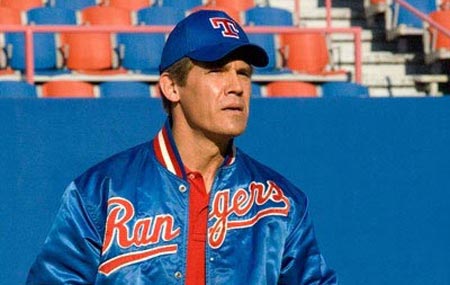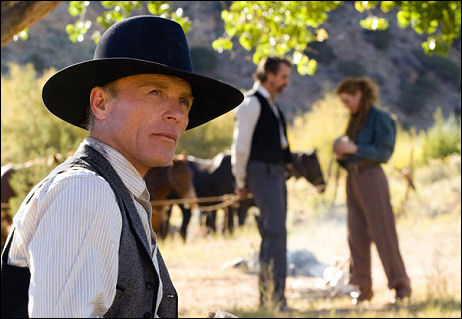3 stars (out of 5)
By R. Kurt Osenlund
Police dramas are a dime a dozen. Whether scrolling through the channel guide or standing in the ticket line, for every award-worthy “Shield” and “Departed,” there's a horde of second-rate “Cold Case”s and “Righteous Kill”s. “Pride and Glory,” an occasionally gripping but overly complicated potboiler about a corrupt pack of New York's finest, ranks somewhere in the middle of this crowded hierarchy, leaning precariously toward the lesser end of it. It's a good thing director and co-writer Gavin O'Connor called in reinforcements.
The movie stars gritty-cop-film-school valedictorians Edward Norton and Colin Farrell as brothers-in-law Ray Tierney and Jimmy Egan, two boys in blue who operate on different ends of the moral spectrum. Ray, living off the grid on a docked boat after an ambiguous tragedy left a scar on his face and his reputation, takes after his father, Chief of Manhattan Detectives Francis Tierney, Sr. (Jon Voight), and swears by the code. Jimmy, living off lousy wages and making up for it with shady deals, serves under Ray's brother, Francis Tierney, Jr. (Noah Emmerich), and hovers above the law. The world of this badge-wielding brood is thrown into an upheaval when four of their fellow officers are slain in a drug bust gone awry. Lured out of hiding and put on the case, Ray smells an in-house rat and all signs point to Jimmy (and, perhaps, Francis, Jr.). In what snowballs into one seriously messy game of good cop/bad cop, Ray must ultimately choose between family ties and professional responsibilities (if only the title, “Justice and Loyalty,” sounded as cool). This is a pedestrian plot that's pretty cut-and-dry once it loops around itself. Getting to that point, though, is quite a bumpy ride.

I certainly don't need – or want – things spelled out for me but “Pride and Glory” had me scrambling for a user's manual. Needlessly gnarled and arbitrary in structure, it breaks its own back with strained attempts at cleverness. Without warning or viewer regard, it throws around names after barely introducing them, builds up urgent scenes then casually breezes through them, hints at dark pasts but takes forever to clarify them – and dares you to keep up. (It wasn't until about halfway through that I realized one main character's sister is another main character's wife.) Watching this movie is like being the stranger at a cliquey social event; everyone's in on the good dish but you. Soon enough, it becomes less an intriguing mystery to solve and more a laborious task to sit through.
To the rescue is a strong-as-steel cast led by Norton, an actor who seems forever cursed to bear the weight of the world on his shoulders. Film after film, role after role, Norton continuously plays characters who are stricken with demons, regrets, or, at the very least, deep thoughts. That niche of emotional and mental baggage is what the thinking-viewer's-favorite plays well; watching him, you can almost hear the gears grinding behind that stern, troubled face. Farrell, who nailed a Norton-type part earlier this year in Martin McDonagh's masterstroke, “In Bruges,” does a complete 180 as Jimmy, a remorseless, money-hungry villain. The notoriously reckless Irishman plays Jimmy scarily well, perhaps tapping into the bad boy that he's finally managed to curb in real life. Farrell does things here that you've never seen him – or, quite possibly, anyone – do on screen before, and the alarm of such heated moments temporarily revives the film.

“Pride and Glory” has bursts of intensity that grab you by the throat. If O'Connor (“Miracle”) and his writing partner, Joe Carnahan (the very similar, “Narc”), had dispersed that energy more evenly, clearly, and carefully, they could have generated a distinctly strong cop picture. Instead, they try to toughen up their material in two-bit ways, such as giving their actors lines that are overflowing with expletives. This movie has enough f-bombs in its first 15 minutes for an entire episode of “The Sopranos,” maybe two (and that's saying a lot). I'm sure O'Connor, who was raised by a New York cop and “grew up in that world,” would argue that this is the way these men really talk. Maybe so, but I believe “NYPD Blue” – arguably the preeminent dramatic depiction of the modern New York police force – made it through 12 seasons without a single utterance of the four-letter-word. Profanity for emphasis of feeling is good. Here, it's used to an extent that's gratuitous and distracting, not to mention silly.
I read a review of “W.” last week in which a critic predicted that Oliver Stone's Bush biopic would be “forgotten in a flash.” I disagree. “Pride and Glory” is much more the type of flick with a one-way ticket to oblivion, forever to be lost in a sea of like-minded fare. Its premium talent (Voight and Emmerich also impress, considerably) and few hard-hitting scenes place it well above some of its brethren, but it's still a movie that's barely worth watching, let alone remembering.







